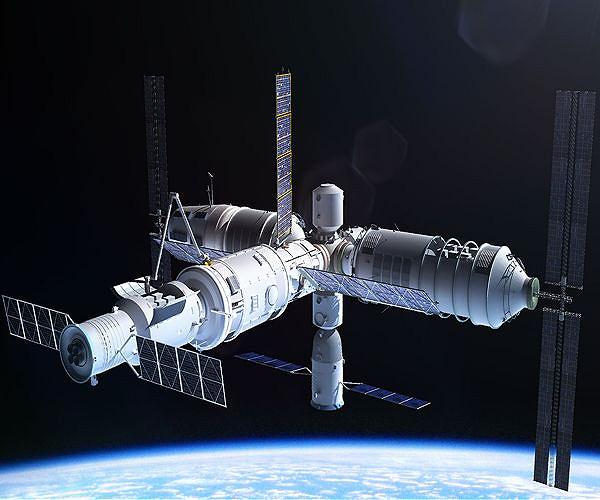
China latest astronaut crew docks at the Tiangong Space Station (Image Credit: Space Daily)
China on Tuesday launched the Shenzhou-15 spacecraft carrying three astronauts to its space station, where they will complete the country’s first-ever crew handover in orbit, state news agency Xinhua reported.
The trio blasted off in a Long March-2F rocket at 11:08 pm (1508 GMT) from the Jiuquan launch centre in northwestern China’s Gobi desert, Xinhua said, citing the China Manned Space Administration (CMSA).
The vessel – carrying veteran Fei Junlong and two first-time astronauts Deng Qingming and Zhang Lu – successfully docked with the station early Wednesday, the agency said, according to Xinhua.
Fei, 57, is returning to space after 17 years, having commanded the Shenzhou-6 mission in 2005.
His team will join three other astronauts aboard the Tiangong space station, who arrived in early June.
“The… main responsibilities for the mission are… achieving the first crew handover in orbit, installing… equipment and facilities inside and outside the space station, and carrying out scientific experiments,” said CMSA spokesman Ji Qiming.
“During the stay, the Shenzhou-15 crew will welcome the visiting Tianzhou-6 cargo ship and hand over (operations to) the Shenzhou-16 manned spaceship, and are planning to return to China’s Dongfeng landing site in May next year.”
The Tiangong space station is a crown jewel in Beijing’s ambitious space programme – which has landed robotic rovers on Mars and the Moon, and made the country the third to put humans in orbit – as it looks to catch up with the United States and Russia.
Tiangong’s final module successfully docked with the core structure earlier this month, state media said – a key step in its completion by year’s end.
“I expect that China will declare construction completion during or at end of the Shenzhou-15 mission,” independent Chinese space analyst Chen Lan said.
China has been excluded from the International Space Station since 2011, when the United States banned NASA from engaging with the country.
Once completed, the Tiangong space station is expected to have a mass of 90 tonnes – around a quarter of the ISS – or similar in size to the Soviet-built Mir station that orbited Earth from the 1980s until 2001.
Tiangong, which means “heavenly palace”, will operate for around a decade and host a variety of experiments in near-zero gravity.
Next year, Beijing plans to launch the Xuntian space telescope with a field of view 350 times that of NASA’s Hubble Space Telescope.
Related Links
China Manned Space Agency
The Chinese Space Program – News, Policy and Technology
China News from SinoDaily.com
|
|
Tweet |
|
|
|
We need your help. The SpaceDaily news network continues to grow but revenues have never been harder to maintain. With the rise of Ad Blockers, and Facebook – our traditional revenue sources via quality network advertising continues to decline. And unlike so many other news sites, we don’t have a paywall – with those annoying usernames and passwords. Our news coverage takes time and effort to publish 365 days a year. If you find our news sites informative and useful then please consider becoming a regular supporter or for now make a one off contribution. |
||
|
SpaceDaily Monthly Supporter $5+ Billed Monthly |
SpaceDaily Contributor $5 Billed Once credit card or paypal |
|
China recruits new reserve astronauts, open to those from Hong Kong, Macao
Jiuquan, China (XNA) Nov 29, 2022
China is projected to recruit 12 to 14 new reserve astronauts, and the selection, which started in September, is open, for the first time, to payload experts from Hong Kong and Macao, according to the China Manned Space Agency on Monday.
It will be the fourth batch of the country’s reserve astronauts. The preliminary selection is currently in progress. The reexamination and confirmation processes will be followed.
Researchers and teachers from sci-tech institutions, universities, and college … read more









